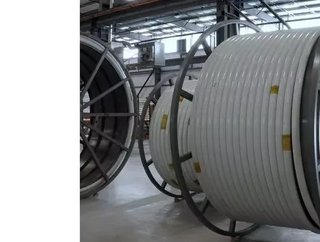Baker Hughes launches onshore composite flexible pipe

Baker Hughes has launched its next generation onshore composite flexible pipe for the energy sector, designed to address corrosion and cost challenges with conventional steel pipes.
The flexible, lightweight reinforced thermoplastic pipe (RTP) offers an economic and environmentally superior alternative to resource-intensive onshore steel pipes, for optimizing the core structure of flowline and oil and gas pipeline networks.
A key feature is its proven spoolable design, making it easier, faster and more cost-effective to transport – reducing installed costs by more than 20 percent. Installation also requires fewer onsite support facilities and heavy vehicles, de-risking operations, taking up less width on a pipeline right-of-way and reducing environmental impact on surrounding land.
"This pipe is the result of our strategic investments for growth in innovative non-metallic materials," said Hatem Haidar, Global Vice President of Flexible Pipe Systems - Onshore at Baker Hughes. "We are committed to supporting safer, more efficient and cost-effective technical solutions to serve the energy sectors, and non-metallics play a key role. We see flexible pipe as a vital component of today and tomorrow’s energy and industrial sectors – enabling the transport of multiple energy sources, including hydrogen and natural gas."
The pipe offers an economic solution for the transport of CO2 and hydrogen, as well as the conversion of existing infrastructure to carry gases.
It is available up to 8 inches in diameter, with a variety of liners including nylon, polyphenylene sulfide (PPS), and high-density polyethylene (HDPE), and delivering fluid pressures up to 2250 PSI and temperatures up to 180°F.
In addition, the pipe’s non-corrosive materials can withstand contaminants without requiring chemical inhibitors, corrosion monitoring and inspection, or disruptive repair work – significantly reducing operating expenses.
The composite pipe will be manufactured at Baker Hughes’ 400,000sq ft facility in Houston.
Baker Hughes recently announced an order with Petrobras to provide digital solutions across its sites in Brazil, covering flare monitoring and calibration technologies, cybersecurity and remote monitoring services, and interconnected machinery protection systems and sensors.






